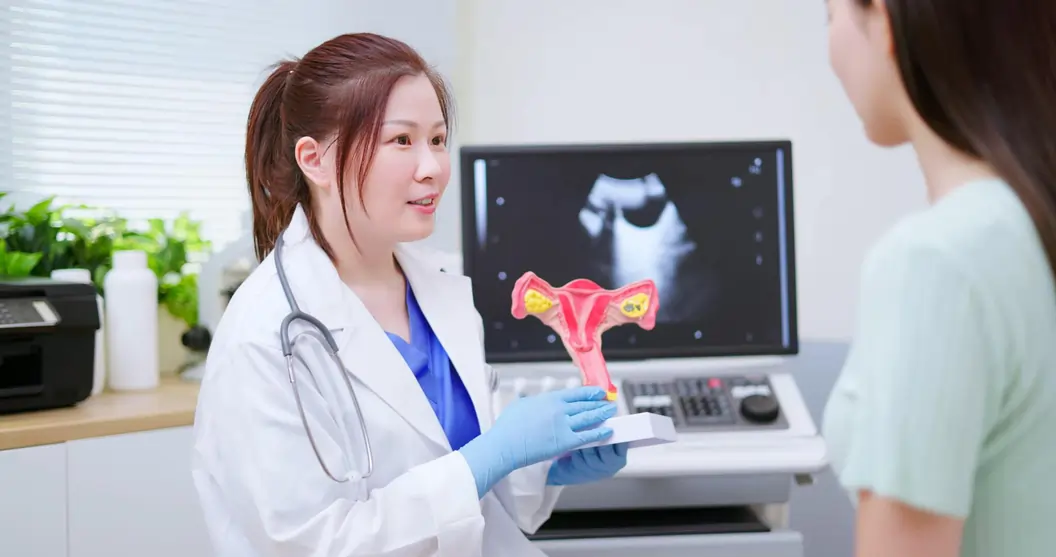What is a good AMH level to get pregnant?
Struggling to conceive? or curious about your egg quality, you might have come across the AMH ovarian reserve test. It's a tool used by doctors to assess your egg reserves. However, it has its limitations. Here's what you need to know if you're trying to get pregnant, concerned about future fertility, or dealing with PCOS.

Dr Disha Sridhar
I am a Gynaecologist Obstetrician ( MD, DNB OBGYN) with an emphasis on INTEGRATIVE MEDICINE.

Ovarian reserve: What you should know?
What's Ovarian Reserve? It's a term that's not clearly defined and can mean different things: how many eggs you have, how good they are, or how likely you are to get pregnant.
- Egg Numbers: You're born with a set number of eggs, and you don't get more. They decrease with each menstrual cycle, especially after you turn 35.
- Menopause: When you run out of eggs, you hit menopause, and your periods stop.
- Guesswork: We can't exactly measure how many eggs you have or how good they are; we just make an educated guess.
- Fertility Prediction: Ovarian reserve is used to guess how likely you are to get pregnant, but it's not always accurate.
How is AMH Connected to Ovarian Reserve?
AMH, or Anti-Mullerian Hormone, is produced by cells in the ovarian follicles, where eggs develop. It gives us an idea about how many follicles you have in your ovaries. If your AMH level is low, it means you have fewer follicles left; if it's high, you have more.
Women nearing menopause or experiencing premature egg aging tend to have very low AMH levels (<1.0 ng/ml). Typically, AMH levels peak around age 25 and become undetectable about 5 years after menopause.
It's important to note that while AMH helps estimate the number of eggs, it doesn't tell us about their quality. Having more eggs doesn't always mean they're of good quality. Quantity and quality are different things, so it's essential to consider both aspects.
Do I Have a normal AMH Level?
There's no universally agreed-upon "normal" level for AMH, the hormone linked to ovarian reserve. For a 35-year-old woman, typical values are:
How Research Evaluates AMH?
Low Levels:
High Levels:
- Linked to lower IVF cycle cancellations, indicating better chances for embryo implantation.
- Lead to more eggs retrieved per cycle and higher rates of live births.
- Result in higher pregnancy rates compared to women with low levels, regardless of age.
Important Note:
- AMH levels don't reveal egg quality. While they're good indicators of how many eggs you'll produce with IVF medications, they can't predict who will successfully get pregnant through IVF.
Assessing AMH: Its Role Compared to Age in Older Women
The test's ability to forecast pregnancy outcomes becomes more reliable with age, a crucial point to note. Many young women with low AMH results have been wrongly labeled as infertile.
While AMH levels are somewhat linked to egg quality, they aren't a definitive indicator on their own. Studies indicate that low AMH levels in one's twenties don't necessarily signify reduced fertility. Similarly, normal levels at age 40 don't guarantee sufficient egg quality for conception.
Age trumps AMH as a predictor of fertility. In essence, AMH alone doesn't provide the complete picture in the general population.

Can AMH Help Diagnose PCOS?
Yes, it can. Here's why: Women with PCOS tend to have lots
of small follicles, which leads to higher levels of AMH. In fact, AMH levels
can be up to 3 times higher in women with early-stage PCOS compared to those
without.
For a more accurate diagnosis, doctors often use a cut-off level of 4.7 ng/ml, but it's important to consider other signs and symptoms alongside AMH levels. However, AMH alone isn't sufficient to diagnose PCOS.
So, What Does AMH
Tell us in the End?
- It's likely the most reliable indicator of ovarian reserve, especially for identifying good responders to IVF treatments.
- It's helpful in confirming a diagnosis of PCOS.
- It's better at predicting egg quality in older women (over 40) compared to younger women.
- It's not very accurate at predicting egg quality in women under 30 when used alone.
- It's not reliable on its own for predicting fertility chances in women under 35.
- It may not accurately predict success with IVF, so it shouldn't be the sole factor in deciding whether to pursue IVF.
Dedicated to your healthy Hormones…
Enroll for Guide To Periods Program
Schedule your video consultation toady ! A happier, healthier you is a click away. !
Originally published March 4, 2024
